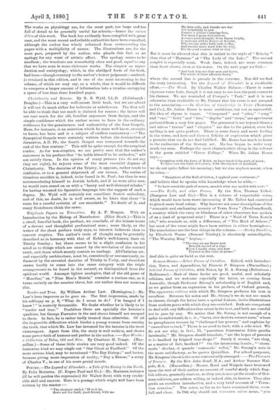Tender and Trite. By William Arthur Law. (Remington.)—Mr. Law's hero
improves as he goes on. The first impression, made by his soliloquy on p. 6, "What do I mean to do ? I'm banged if I know !" is scarcely favourable. We doubt whether he is likely to be " tender and true." Doubtless these are specially the heroine's qualities, but George Forrester in the end shows himself not unequal -to them. In fact, he is rather badly treated than otherwise. Of all the impossible difficulties which hinder a young woman from owning the truth, that which Mr. Law has invented for his heroine is the most extravagant. Apart from this, the story is well writt?n, and shows -some power both of humour and pathos in the author.—Bye-Words : a Collection of Tales, Old and New. By Charlotte M. Yonge. (Mac- millan.)—Some of these little stories are very good indeed. Of the -humorous kind we may single out" Our Ghost at Faulford." Of the more serious kind, may be mentioned "The Boy Bishop ;" and better, because giving more impression of reality, "Buy a Broom," a story of Charles V., in one of his more genial moods.


































 Previous page
Previous page